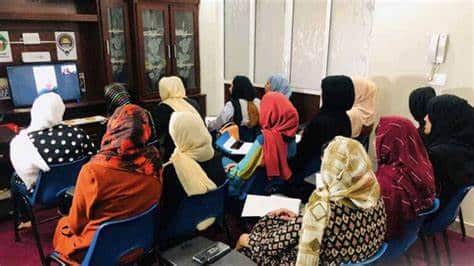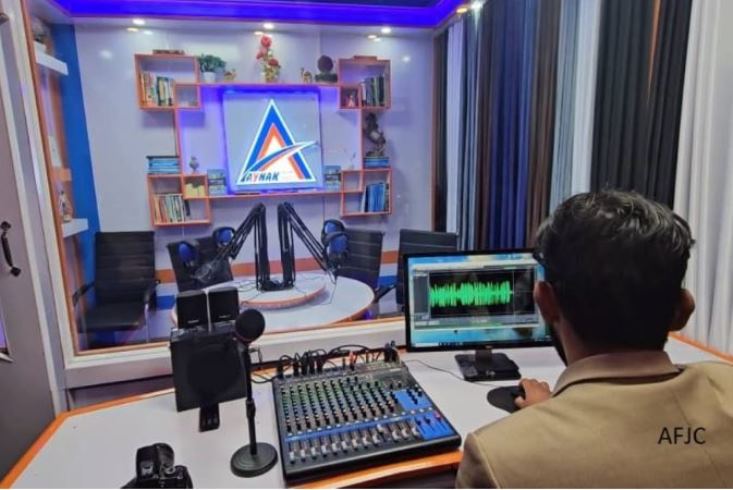
MAJOR OUTBREAK OF DISEASE ESCALATING IN CAMPS AS 250,000 PEOPLE, MOSTLY CHILDREN, RETURN TO AFGHANISTAN FROM PAKISTAN
شیوع بیماری گسترده در کمپ ها با بازگشت 250,000 نفر عمدتاً کودک، از پاکستان به افغانستان
به گفته Save the Children، هزاران پناهجوی افغان که در هفتههای اخیر از پاکستان وارد افغانستان شدهاند، سطوح هشداردهندهای از بیماریهای جدی را تجربه میکنند که به سرعت در حال تشدید است، از جمله اسهال حاد خطرناک و بسیار مسری.
در ماه گذشته بیش از 3000 مورد عفونت حاد تنفسی و 1200 مورد اسهال در کودکان در مراکز درمانی Save the Children گزارش شده است. خانواده هایی که دسترسی محدودی به آب تمیز برای آشامیدن و شستن دارند و یا به دلیل کمبود توالت مجبور به اجابت مزاج در فضای باز هستند، باعث این امر می شود.
طبق اعلام سازمان ملل متحد، پس از اعلام پاکستان مبنی بر اینکه همه خارجی های غیرقانونی باید داوطلبانه تا اول نوامبر کشور را ترک کنند، در غیر این صورت با اخراج مواجه خواهند شد، از اول اکتبر تاکنون حدود 286000 نفر از پاکستان به افغانستان بازگشته اند که 139000 نفر تنها در ماه نوامبر وارد افغانستان شده اند.
اکثریت قریب به اتفاق – یا 80 درصد – از افرادی که به افغانستان باز می گردند را زنان و کودکان تشکیل می دهند، یا تقریباً یک نفر از هر چهار عودت کننده کودک زیر پنج سال و بیش از 60 درصد از عودت کنندگان کودکان زیر 17 سال و کمتر.
به گفته Save the Children بسیاری از خانواده های بازگشته متوجه شده اند که جایی برای زندگی ندارند، و پولی برای غذا ندارند و در پناهگاه های معمولی در وضعیت ناامیدکننده و بدتر به سر می برند.
عفونتهای شدید تنفسی احتمالاً به دلیل قرار گرفتن طولانی مدت در معرض طوفانهای گرد و غبار، پناهگاههای دود آلود سرپوشیده، سایر افراد بیمار و هوای بسیار سرد، است. زیرا بسیاری از خانوادهها با کامیونهای باز و پر ازدحام به افغانستان سفر کردهاند.
شریفه*، 20 ساله، یک زن افغان که اخیراً به افغانستان بازگشته است، گفت:
جمعیت در تورخم بسیار زیاد است و برای کودکان و زنان مناسب نیست. شب سرد می شود و بچه ها لباس گرم ندارند. همچنین توالت و آب آشامیدنی کافی وجود ندارد. ما حداقل یک سرپناه مناسب برای خود می خواهیم.»
شیرین*، 40 ساله، پس از بازگشت به افغانستان در کمپ است. او میگویید:
در این چادر با خانواده، عروس و نوه 18 ماهه ام را داریم، نوه من به لباس گرم و سرپناه نیاز دارد، با این حال چهار شب را بیرون از خانه بدون سرپناه و حتی چادر گذرانده ایم. دخترم فرزانه* به دلیل سردی هوا مریض شد و حالا تب و سرماخوردگی دارد».
دکتر فهیمه*، 38 ساله، دکتری که با Save the Children کار می کند، می گویید:
وضعیت سلامتی کودکان خوب نیست، اکثرا معده درد دارند، به دلیل نبود آب تمیز و امکانات بهداشتی مناسب، نمی توانند دست های خود را به درستی بشویند، سرویس بهداشتی مناسبی وجود ندارد و این کودکان غذای منظم و مناسبی دریافت نمی کنند. اگر مدت طولانی تری اینجا بمانند یا شرایط ادامه پیدا کند و هوا سردتر شود خطرات زیادی برای سلامتی بچه ها به همراه خواهد داشت.شب اینجا هوا سرد می شود و تامین رفاه بچه ها در داخل این چادرها مشکل است. این مشکل می تواند بر سلامت کودک و مادر تأثیر منفی بگذارد، نیاز مبرمی به تهیه لباس گرم برای کودکان و همچنین تهیه اقلام ضروری مانند نوار بهداشتی و لباس زیر برای زنان جوان وجود دارد. خطرات سلامتی که زنان و کودکان را تحت تأثیر قرار می دهد.
Save the Children افغانستان یک تیم سیار صحی را برای ارائه خدمات بهداشتی، تغذیه و روانی اجتماعی به خانواده هایی که از پاکستان باز می گردند، مستقر کرده است و 10 توالت تفکیک شده بر اساس جنسیت ساخته است تا اطمینان حاصل شود که خانواده ها در فضای باز مدفوع نمی کنند. همچنین از طریق حدود 20 ایستگاه آب، آب آشامیدنی پاک و سالم را تامین می کند. علاوه بر این، Save the Children در حال ایجاد فضاهای دوستدار کودک برای کودکان است تا اطمینان حاصل شود که در حین پردازش اسناد خانواده آنها از یک منطقه امن برخوردار هستند.
ارشد مالک، رئیس سازمان نجات کودکان در افغانستان گفت:
تشدید موارد عفونتهای حاد تنفسی و اسهال دلیل اصلی نگرانی است. با ادامه هجوم مردم، چالشهای مرتبط با تامین آب و امکانات بهداشتی کافی، بهویژه برای خانوادهها و دختران، بیشتر میشود. نیاز فوری به راهحلهای جامع و پایدار برای رسیدگی به بحران بالقوه سلامت و تضمین رفاه جمعیت ورودی بسیار مهم است.
«این خانوادههای بازگشته تقریباً بدون هیچ چیز به افغانستان میرسند و با واقعیتی تلخ روبرو میشوند – تضاد آشکار با ثباتی که به شدت به آن نیاز دارند. به دلیل بحران انسانی موجود، زمستان قریب الوقوع فوریت برای کمک های فوری را تشدید می کند. ملت بدون حمایت جمعی نمی تواند در برابر هجوم گسترده مردم مقاومت کند.»
Save the Children از سال 1976 از جوامع و از حقوق کودکان در سراسر افغانستان حمایت می کند، از جمله در دوره های درگیری و بلایای طبیعی. ما در 9 ولایت برنامه داریم و در هفت استان دیگر با شرکا کار می کنیم.
از آگوست 2021، ما فعالیت خود را برای حمایت از تعداد فزاینده کودکان نیازمند افزایش داده ایم. ما بهداشت، تغذیه، آموزش، حفاظت از کودکان، سرپناه، آب، بهداشت و بهداشت و حمایت معیشتی را ارائه می دهیم.
Thousands of Afghan refugees who have crossed into Afghanistan from Pakistan in recent weeks are experiencing alarming levels of serious illnesses that are escalating quickly, including life-threatening and highly contagious acute diarrhoea, said Save the Children.
Over 3,000 cases of acute respiratory infections and 1,200 cases of diarrhoea in children have been reported at Save the Children health facilities in the past month. This is being driven by families having limited or no access to clean water for drinking and washing, and people being forced to defecate in the open due to a lack of toilets.
Some 286,000 people have returned to Afghanistan from Pakistan since 1 October, with 139,000 arriving in November alone, according to the UN, after Pakistan announced that all undocumented foreigners must leave the country voluntarily by 1 November or face deportation.
The vast majority – or 80% – of people returning to Afghanistan are women and children, with nearly one in four returnees children under five, and over 60% of returnees children under 17and below [1].
Many returnee families have found they have nowhere to live, and no money for food, and are staying in basaic shelters in a desperate and worsening situation, Save the Children said.
The severe respiratory infections are likely due to prolonged exposure to dust storms, enclosed smoky shelters, other sick people, and extreme cold weather, as many families have travelled to Afghanistan in open, overcrowded trucks.
Sharifa*, 20, an Afghan woman who recently travelled back to Afghanistan, said:
“The crowd at Torkham is overwhelming and not suitable for children and women. It gets cold at night and children do not have warm clothes. There are also few toilets and not enough drinking water. We want at least a proper shelter for us.”
Shireen*, 40, is in a camp after returning to Afghanistan. She said:
“In this tent with our family, we have my daughter-in-law and my 18-month-old grandson. My grandson needs warm clothes and a shelter. However, we have spent four nights outside without any shelter or even a tent. My daughter Farzana* got sick because of the cold weather and now she has a fever and a cold.”
Dr. Fahima*, 38, a doctor working with Save the Children, said:
“Children’s health condition is not good; most have stomach pains. Due to the lack of clean water and proper hygiene facilities, they cannot wash their hands properly. There are no proper clean toilets, and these children are not receiving regular and proper meals. If they stay here for a longer time or if the situation persists and the weather becomes colder, there will be many health risks for the children. It gets cold here at night, and it is difficult to ensure well-being of children inside these tents. This problem can negatively affect the health of both the child and the mother. There is an urgent need to provide warm clothes for children, as well as necessary items such as sanitary pads and underwear for young women. These items are essential to reduce the health risks that affect women and children.”
Save the Children Afghanistan has deployed a Mobile Health Team to provide health, nutrition, and psychosocial services to families returning from Pakistan, and built 10 gender-segregated toilets to ensure families are not defecating in the open. It is also providing clean and safe drinking water through about 20 water stations. In addition, Save the Children is establishing child-friendly spaces for children to ensure they have a safe area while their families’ documents are processed.
Arshad Malik, Country Director for Save the Children in Afghanistan, said:
“The escalating cases of acute respiratory infections and diarrhoea present a major cause for concern. As the influx of people continues, the challenges associated with providing adequate water and hygiene facilities, particularly for families and girls, become even more pronounced. The urgent need for comprehensive and sustainable solutions is paramount to address the potential health crisis and ensure the well-being of the arriving population.
“These returning families arrive in Afghanistan with virtually nothing and face a grim reality – a stark contrast to the stability they desperately need. Compounded by existing humanitarian crisis, the impending winter intensifies the urgency for immediate assistance. The nation cannot withstand a mass influx of people without collective support.”
Save the Children has been supporting communities and protecting children’s rights across Afghanistan since 1976, including during periods of conflict and natural disasters. We have programmes in nine provinces and work with partners in an additional seven provinces.
Since August 2021, we’ve been scaling up our response to support the increasing number of children in need. We are delivering health, nutrition, education, child protection, shelter, water, sanitation and hygiene, and livelihood support.
Main Resource Link
- Tags
- Asia



